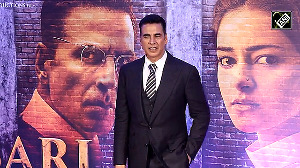Steinem says a feminist is one who can be a woman or a man, who believes in the full social, economic, political equality of women and men.
Her association with India goes back to the 1950s when she came to the country on a two-year study tour. India's poverty and social conditions transformed her outlook completely.
At that time she had said, 'America is an enormous frosted cupcake in the middle of millions of starving people.' She became a firebrand journalist, keeping the ideals of social justice in her heart and went on to become a fearless spokesperson of women's plight. She exposed men's lack of concern for women's sensitivity, and became a political activist and institution builder.
I feel when the history of women of this planet will be written, Gloria Steinem's name will be written in bold letters. She contributed in changing how the world thinks about women. She knew why women fear change or equal treatment for themselves. Women fear that 'change' may bring punishment, and she told them: 'The truth will set you free. But first, it will piss you off.'
In the 1970s, she launched Ms magazine; while editing it she resisted attempts by market forces to convert all women into consumers. She said about her struggle, 'We've taken one giant step forward by convincing the majority of the country that women can do what men can do.' Her messages were always clear and curt; her logic, piercing.
She asked of men: 'We know that we can do what men can do, but we still don't know that men can do what women can do. That's absolutely crucial. We can't go on doing two jobs.'
Steinem told me only 10 per cent success has been achieved in the women's movement's long battle to make men understand women.
How do you see the effect of globalisation on the women of the world?
There is nothing wrong in gloablisation as such but the question is, what values are being globalised. If environmental protection is globalised, globalisation will be a good thing but unfortunately what is being globalised is corporate values, which turns much of the world labour into a cheap labour force. It turns people into consumers to buy products which they could have produced in their own countries.
Globalisation is profit to a very small group of people. I feel globalisation is a new form of colonialism. It is imperialism.
How does it affect women directly?
It does. A majority of women in the world constitute cheap labour. The corporations are making their profit from cheap labour. Sex trafficking worldwide has also increased enormously. Bonded workers are a form of slavery and 80 per cent of them are children and women.
Clearly, globalisation is disproportionately affecting women. The more control we take locally, like controlling our own businesses, have our unions, the better we will be.
How do you define feminism?
A man or woman, either one, who believes in equality and an equal world for males and females. It just means that they believe in equal values for both.
A man who believes so is a feminist. We have faced 8,000 years of inequality but we must remember that those 8,000 years are only about 5 per cent of human history.
When you were in your 20s the world was different. How do you look back at that period?
It has completely changed. When I was 20, there was no women's movement. There was no feminism in my life. At 20, I thought I had to NOT be something myself but marry. I could not give birth to myself so I have to give a birth to someone else. I thought there was no way out of the authoritarian patriarchal system.
Only when I was in the 30s, the women's movement came along and I realised that this doesn't have to be this way. We can change it. We can refuse to play this world. We are unique individuals, masculine and feminine, each are unique individuals.
At the end of such a long movement what are the major changes you find in yourself?
In me? I am much, much, much happier. Because I know I am not alone. I know I am not crazy (laughs delicately). I have sisters everywhere I go. There is a women's movement in every country and there are many men who are feminist, too.
What was the turning point in your life as a woman activist?
It was very important for me to come to live in India. I didn't realise at that time. But, later I understood that India had taught me how to organise (the movement). In the 1950s when I came to India, Gandhiji's and Vinoba Bhave's land reform movement was very much alive.
India taught me how to organise. India taught me that the United States is the exception in the world, and not the world in economic terms. If you live in the US you tend to think that in the whole world there is some similarity to it.
But coming to India changed my view. India represents the world much better than the United States does in terms of how people live.
Which are the phases in the women's movement that have made you happy, now?
I was able to use my own experience to help other women and other women used their experiences to help me. Through this movement I discovered a community. I discovered hopes. I discovered dreams I thought don't exist. I feel reborn through feminism.
What are the changes you find in the women of India today?
I find them much freer, much more individual, and much more able to speak, using much more talent. I don't want to generalise but India is very, very different than when I lived here before.
You were criticised when you got married, many women asked you how can you do that?
No, I didn't get that kind of response. It was clear in the United States that I haven't changed; the institution of marriage has changed. Marriage is now an equal institution legally.
I didn't have to give up my name or any of my civil rights as I would have before the women's movement. What the world means by marriage is that now it is possible to make an equal partnership. Still, the problem with marriage (on the) legal (front), is that two women can't get married, two men can marry. We are fighting to make that possible.
You have said that with the birth of a child the man-woman relationship gets unequal, why do you say that?
Because, a woman is encouraged to give birth to other people but not to herself.
It becomes destructive for everyone when she tries to realise her dreams through her children. She tries to control her children.
We have to give birth to ourselves first. We have to discover our talent and uniqueness first. You are a unique person. No one else is like you, right? You have the talent no one else has. So, you can learn to use that to give birth, literally, to yourself. You should not be just a biological machine to give birth to other people.
We have read about you on the Internet and books. In person you look a little sad, or I should say mellowed? Is it because of the struggles you have gone through?
Am I sad? Am I feeling sad? Like what?
How do you feel today?
I was on a long journey, that I realised while looking back. There was a direction even when I felt there was no direction. I just feel very lucky, very happy to be a part of something I care so deeply about.
I am angry and feel terrible when I see injustice. But I am much more in balance. I don't feel any more that I have to imitate someone else. I don't need approval. These are some of the benefits of age.
Specially, when you are able to do what you love. I am able to do what I love.
No regrets?
No regrets. Well, yes... I have one regret. I should have done it much more quickly. I regret wasting time.
Do you think you have achieved a substantial part of your goal?
No, I think that will be achieved in future. In spite of my age I am still directed towards the future.
After the historical feminist movement do you think the world has changed?
I think the world has changed perhaps, maybe, 10 per cent!







 © 2025
© 2025